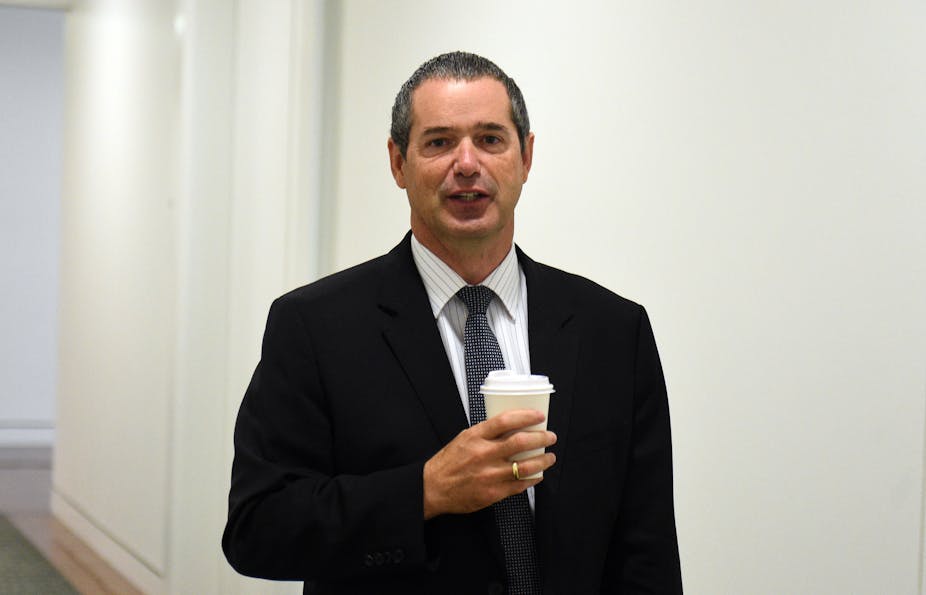Bill Shorten has lost a very important member of his praetorian guard, in an exit from parliament that came as a complete surprise and was executed in the strangest manner.
Stephen Conroy, Labor’s deputy Senate leader and one of the right faction’s hardest men, has watched Shorten’s back. Yet when Conroy tabled his resignation in the Senate just before 9pm on Thursday, Shorten – who was overseas – wasn’t aware of it.
The two didn’t speak until Friday morning, after some extensive phone tagging. It is not known when this “tagging” began.
Acting leader Tanya Plibersek hadn’t a clue until confronted with a question at a Friday news conference. One Conroy ally thought it was a hoax when the news broke early Friday.
During the debate on the omnibus savings bill Conroy rose, said a few nice things about deputy Senate leader and Finance Minister Mathias Cormann in the context of the legislation, and then added that as it was late he’d “table the rest of my contribution so we can move on”.
No-one thought twice about the “contribution”, assuming it was about the bill. Instead it commenced: “You should always go out on top. This week as captain of the parliamentary soccer team I scored a hat-trick. It must be time to say farewell.”
The text offered multiple thanks, and pointed to his departure being about family: “When you resent being in Canberra because you are missing your daughter’s soccer training it is time to retire from the federal parliament.”
There were two questions on Labor lips. Was there more to Conroy’s quitting, coming so soon after he had gone to an election? And why had he made his announcement in this odd way?
As of Friday no explanation for the departure had emerged beyond his own comments about family. Conroy’s office was recently targeted in police raids over NBN leaks but nobody thinks that has any relevance. His resignation was as hard to explain as that of then-minister Mark Arbib from the Gillard government, just after he was given a plum job.
As for the secretive manner of Conroy’s resignation, catching his own senior colleagues out, that’s simply inexplicable.
Conroy, who was communications minister under Labor, said in a short Friday statement “the National Broadband Network will remain my greatest contribution”, although that project left him with a contested record.
More fraught were his efforts to put in place regulations affecting the newspaper industry. Bitterly fought by media companies, the legislation failed but the attempt inflicted damage on the Gillard government, already on the ropes.
Given Conroy’s heavy factional role in Victoria and nationally, his departure will have potential medium-term implications within Labor. Shorten is travelling very well at the moment but if the Turnbull government regained its feet and he slipped back, leadership speculation would start.
Victory at the next election being tantalisingly close on the numbers, Anthony Albanese awaits an opportunity that may or may not come. With Conroy there, Shorten had greater protection for bad times.
A second high-profile resignation was announced more conventionally on Friday, but still came out of the blue. The stepping down of senior bureaucrat Jane Halton, who has headed the finance department since 2014 and previously the health department for 12 years, marks the exit of the longest-serving of the present departmental secretaries.
Halton virtually grew up in the public service. Her father, the late Charles Halton, an Englishman working in Canada, was brought to Australia by the Whitlam government as secretary of the transport department; he later served the Coalition government.
Halton in a Friday message to staff noted she’d beaten her father’s record of time as a secretary, “a personal milestone”.
Her career has had its share of controversy. John Howard’s head of the prime minister’s department, Max Moore-Wilton appointed her to lead the people-smuggling taskforce, putting her on the front line during the first “Pacific solution”, and the “children overboard” affair when the political climate was red hot.
The role gained her enemies and admirers. Margo Kingston’s 2002 profile reported, “she’s famous for shocking dithering blokes round a meeting table with: ‘Haven’t any of you got balls!’”.
As health department secretary Halton struck up a good relationship with then-minister Tony Abbott. After he became prime minister there was some speculation she could become the first woman to head the prime minister’s department, but instead she was appointed the first female secretary of finance.
In his tribute to her, Cormann – who was also finance spokesman in opposition – said: “Senate estimates is more fun with Jane sitting next to you rather than on the other side of the table.”
When estimates convene next month, Cormann will have a different woman beside him – deputy secretary Rosemary Huxtable, who is acting secretary until a permanent appointment is made.

